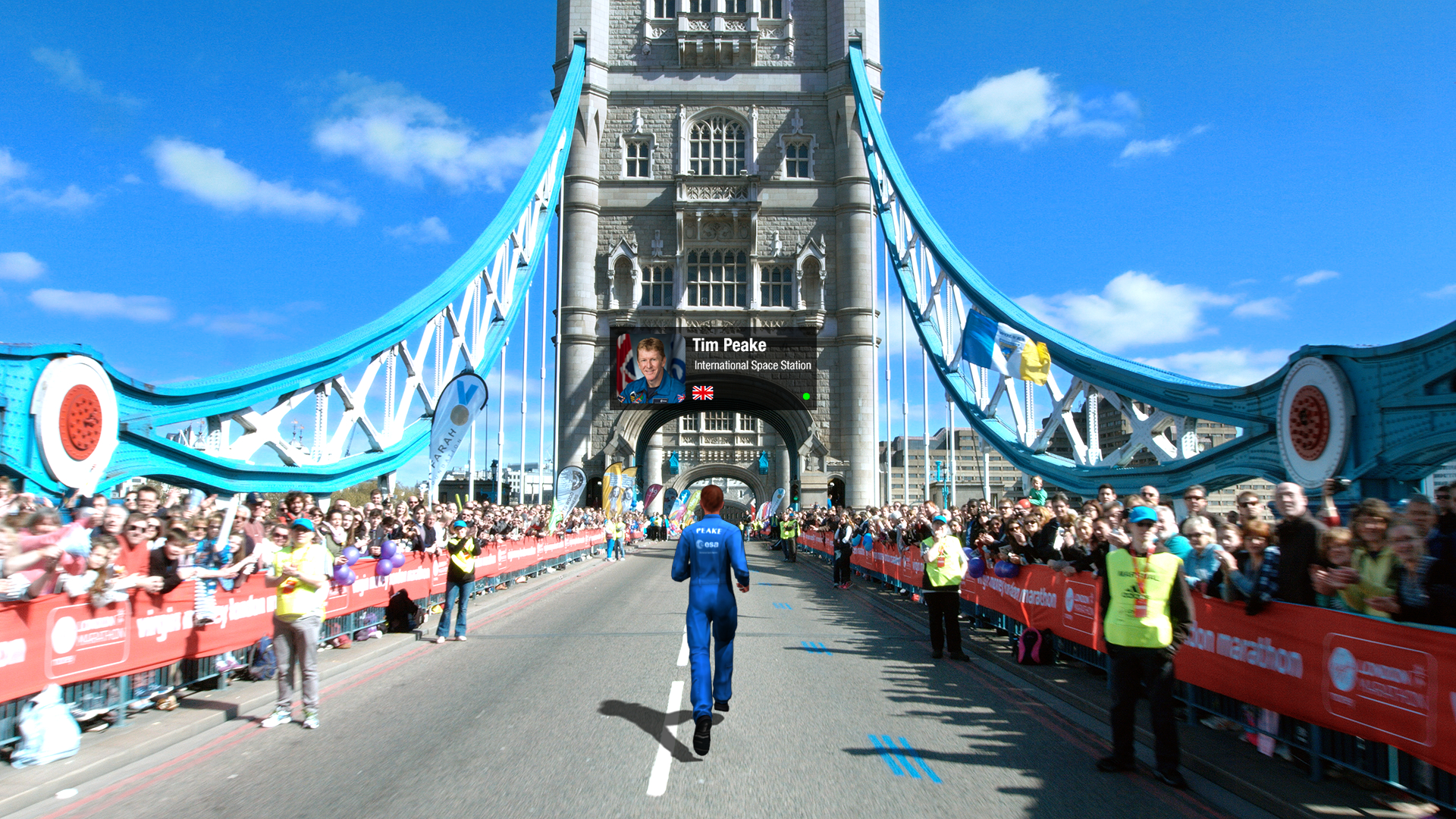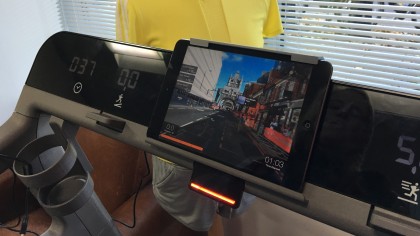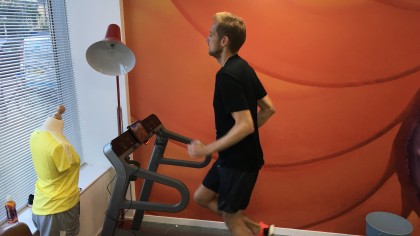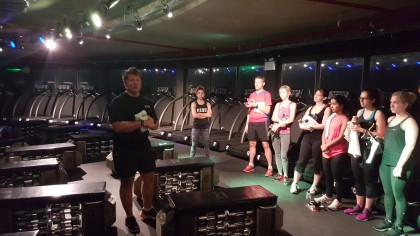I missed out on the London Marathon... but I'm still running it
And I'll even get to race an astronaut

I really don't like using treadmills at all - they're a prison compared to the freedom of running outdoors.
I also really dislike the thought of doing a marathon too - I did one earlier this year, but it was by myself, starting at 5AM for charity. It's just running a long way for a really long time… boring.
So why does the thought of combining the two together entice me into doing my next marathon?
Well, this is different. I'm going to be racing an astronaut, and I'll be running the London Marathon at the same time as the thousand others in the capital - despite missing out on the ballot process.
OK - I'll be running it on a treadmill, and just because I'll be starting at the same time as the rest of the runners, doesn't mean this is anything new. People have been doing this for countless years and it's a long way removed from being involved in the actual thing.
But this year it's all different - THANK YOU TECHNOLOGY - because I'll be running a digital version of the course that'll progress as I run the distance. RunSocial spent the 2013 and 2014 London Marathon digitally mapping the course, taking 3D pictures of the crowd cheering along the way.
Come the morning I'll step onto the treadmill, plug in the Bluetooth TreadTracker that slips under the treadmill belt, pop an iPad in front of me and start running. But here's the best bit: everyone else doing the same race will show up as digital avatars around me, showing how fast they're running just like in the real thing.
Sign up for breaking news, reviews, opinion, top tech deals, and more.

You don't need the TreadTracker (which costs around £100 / $120 / AU$150) as you can use the pedometer in the iPad to register your steps onto the treadmill, or go all out and get a treadmill that can connect to RunSocial directly, meaning it can register the incline too.
I know that running it there would be better, with the atmosphere, the cheering, the tired breathing of everyone around you, the beating of the feet of the person that you've been chasing down for the last 15 miles all making it an amazing day.
But most of us didn't get in, with over 1 in 4 not getting a place despite trying, and the RunSocial method means we'll all be able to do it. You have to buy the London Marathon course on the RunSocial app (£4.99 in the UK, varying around the world), but everyone that balloted and failed to get into the London Marathon will get a code to run it for free.
I'm going to need to work hard on the set up though - I tried the system out with an iPad mini, a treadmill and the TreadTracker, and my neck was hurting with looking down at the screen after a few minutes.
However, you can use Apple TV to connect up to a larger screen (or get the HDMI connector) so it's a more natural angle for your head to hang at.
It was still using a treadmill though, despite how engaging the screen was with the running - I really missed being outside, but it's nice to have that control. I'll even miss the anger at going up and down the slight inclines around the course, so I'll be doing my best to working out how to add that in.
And there's the danger that someone could be running the race on the treadmill while just sitting on a chair eating chocolate while they leave the belt running at an astronomical speed - but let's just hope that if I'm in a footrace to the finish line then I'm against someone honest.

And given Tim Peake, the British astronaut, will be running the same race from space, that'll be a big scalp to aim for… although he's only going to have 80% of his bodyweight, so that's an advantage.
On the other hand, he's going to have to have a hugely uncomfortable harness, and he is running it on behalf of the Prince's Trust, so I'll allow it.
Now, to the internet: 'how to train for a marathon'…
MyZone, YourZone
I've been trialling another system at the moment, the MZ3 from MyZone. It's a heart rate monitor that sits like most others around the chest, but has a 'handicap' system to show you how hard you're working compared to any other athlete around.
The system is simple: you enter body metrics, including height, weight and age, and the system will calibrate to you over time. This generates your four effort zones depending on how hard you're working, and when the belt is connected to your phone you can see in real time your relative effort.
These generate MEPs (MyZone Effort Points) where the more effort you put in, the more MEPs each minute you spend exercising you'll be awarded. This means your effort level is being rewarded, rather than pace or weight lifted, so if you're trying to show how hard you're pushing compared to your ultra fit friend, this is the way to do it.

I've found a few issues with the system so far, but on the whole it's an interesting system that works best when you're connected with friends and you're all trying to achieve the most MEPs each day.
For runners though, you'll need either the proprietary smartwatch or an Android Wear / Apple Watch to see it on the screen to get real time feedback on your effort levels.
One to watch - I'll be playing with this a fair bit over the next few weeks before bringing a full review. But if I have to wear more than two heart rate monitors at the same time in the future, I think I won't be able to breathe…
- Gareth Beavis is TechRadar's Running Man of Tech, testing the latest in fitness technology in a never-ending quest to run further and faster and bringing you the results in a weekly column.
- If you want to say hi, he's @superbeav on Twitter
- You can see his stumblings on Strava
- And for more data, follow him on Smashrun - if you want to sign up, please use this link
- (once you see the service, you'll work out why...)
- And if you want to get the full lowdown on the latest and greatest running tech, read the rest of the Running Man of Tech story here

Gareth has been part of the consumer technology world in a career spanning three decades. He started life as a staff writer on the fledgling TechRadar, and has grew with the site (primarily as phones, tablets and wearables editor) until becoming Global Editor in Chief in 2018. Gareth has written over 4,000 articles for TechRadar, has contributed expert insight to a number of other publications, chaired panels on zeitgeist technologies, presented at the Gadget Show Live as well as representing the brand on TV and radio for multiple channels including Sky, BBC, ITV and Al-Jazeera. Passionate about fitness, he can bore anyone rigid about stress management, sleep tracking, heart rate variance as well as bemoaning something about the latest iPhone, Galaxy or OLED TV.